Critical Childhood Studies: New Academic Field Dismantles Safeguarding
Scholars deconstruct childhood with arguments similar to pro-pedophile organizations.

Critical Childhood Studies (CCS) is an emerging academic field that has developed over the past two decades. The field belongs in the same ballpark as Critical Race Theory or former Women’s Studies (now Gender or Queer Studies). Established to examine the histories and provide cultural context for people oppressed on the basis of race and sex, these fields have morphed.
Rather than helping oppressed communities, critical scholars often promote ideological views on race and “gender” that ultimately do the exact opposite: further fuel racism and sexism. Critical Childhood Studies (CCS) has fallen into the same trap — deconstructing childhood to a degree that, if applied outside of an academic setting, would put children in danger.
In the words of CCS academics, they explore “the history and construction of childhood" and "textual and visual representations of childhood.” Adding a postmodern flair, there's “childhood as metaphor, and children as agents of cultural production," as well.
The CCS Project elaborates:
“Characterized by its intersections with such fields as gender studies, disability studies, race studies, queer studies, and animal studies, the field of critical childhood studies offers scholars a rich interpretive methodology to explore questions related to difference, power, affect, and subjectivity.”
In more ways than one, the academic study of children has encountered the fate of sex and race. While some CCS scholars still study how to make young humans’ lives better, many deny the group exists at all. Such a notion, of course, undermines the whole field. How can one research a group that is not?
Yet, not all CCS scholars reject their subjects. In an analogy to other “critical” theories, we can divide CCS's intellectual fruits into three.
First comes the rarest: The Helpful. These CCS scholars do work such as studying the ways Nigerian children are being trafficked.
Second, and the greatest chunk, consists of The Incomprehensible. So is Moody et al., who claim that: "Extending on the concepts of ‘little publics’ and ‘posthuman citizenships,’” their book “progresses these notions with a view to modelling, and better understanding, posthuman publics and civics." The creators of the Postmodernist Essay Generator would be proud.
Third, we arrive at the harmful community of Critical Childhood Studies scholarship: one that seeks to tear down the fundamentals of child safeguarding.
For example, in his 2020 book, CCS researcher Jacob Breslow agrees with other scholars that there exist "queer children." They’re defined as ones that "display interest in sex generally... in same-sex erotic attachments, or in cross-generational attachments."
Thus, these Childhood Studies academics not only label molested children “queer,” but imply they “display interest” in being molested.
The claims that children wish to be sexually abused by adults form only a minor part of the field. But, the more popular theory that “childhood doesn’t exist,” despite being esoteric nonsense, can also lead to safeguarding issues. One dangerous result of this framework is “the concept of childhood is violence” theory.
CCS Scholars Argue that “Childhood is Violence”
A 2021 online book launch by Jacob Breslow, a lecturer at the London School of Economics, mentioned the “violence of childhood.” Three Critical Childhood scholars gave speeches at the event, hosted by LSE Gender.
In her contribution, Erica Meiners claimed that the “categorizations- adult, child, youth perform a kind of violence and ontological disqualification.” She added there is “ violence incurred by the ontological register of childhood.”
Besides violence, according to CCS scholars, childhood causes injustice. Speaking at the same event, Mary Zaborskis claimed that childhood enables “racism, transmisogyny, heteronormativity and the violence of the border.” Death was also evoked. In Zaborskis’ words, “childhood itself is ambivalent at best and deadly at worst.”
Zaborskis also argued against child safeguarding. According to her, “making bids for expanded inclusion or representation or care for the child can often be a guise for violence.” The scholar added that “childhood innocence,” is a “pernicious racialized construction.”
The third guest speaker, Jules Gill-Peterson, took it a step further with his stated wish to “abolish childhood.” According to him, “the world would simply be better without the concept of childhood.” But, as this trans-identified male scholar added in disappointment, such a “conclusion is a bit of magical thinking.”
This was not the first time Gill-Peterson, allegedly, dreamed aloud of abolishing childhood. Erica Meiners brought back a memory:
“At a small scholarly convening on Childhood studies in the city of Pittsburgh several years ago, I was at a session and during the session and during the Q&A someone, I'm kind of sure it was you, Jules, but maybe not, energetically identified as a child abolitionist.”
What is a world with no childhood?
If, as Gill-Peterson advocates, society abolished childhood, what would this look like? In a glance back to the 17th century, kids would be considered “little adults.” As such, they would not only lose protections, but gain rights too.
There may be some lines in childhood that are arbitrary — for example, the fact that in the US a teenager can drive at 16, vote at 18, and drink alcohol at 21. An honest examination of the logic and science behind when certain rights are granted to people as they come of age could certainly be warranted.
However, a toddler would hardly be empowered by voting, running for office, owning property, and working for money.
Prior to the child labor laws enacted after the industrial revolution, children from poor families often began to work in factories between the ages of eight to ten. This work was grueling and dangerous. Modern laws that recognize children as needing protection help prevent this sort of abuse. With the abolition of childhood, “tiny adults” would lose safeguards against exploitation. This includes, of course, child protection laws against sexual abuse.
“...the topic of ‘child sex’ regularly pops up in Childhood Studies.”
Despite skating widely around the issue, or using unintelligible language, the topic of “child sex” regularly pops up in Childhood Studies. Not only can we find the idea that children aren’t harmed by sexual contact with adults sprinkled through the contemporary CCS: It prominently features in a text deemed foundational to the field.
In Philippe Aries’ 1960 book, he graphically describes sexual acts performed on the future French king Louis XIII. From age one to four, adults subjected Louis to sexual language, masturbated him, performed oral sex on him, and made him act out sexually with his little sister in front of them. Then, according to Aries, around Louis’ age of five, the little king behaved sexually with his chambermaid and with other adults.
As Aries explains, these actions, while seen as “perverse” now, were widespread and accepted in the 17th century. Not only at the French court. The author claims that “the practice of associating children with sexual ribaldries [sic] of adults formed part of contemporary manner.”
The reader would search in vain for a call for child safeguarding in this foundational text of Childhood Studies. In fact, the author never condemns the 17th century's lack of protection against child sexual exploitation. Instead, Aries argues that, because “customs” related to age, including sexual ones, have changed with time, “childhood is socially constructed.”
If it quacks like a pedophile…
In 1988, Mary De Young researched justifications used in self-published texts by pedophilic organizations The Rene Guyon Society, the Childhood Sensuality Circle, and the North American Man/Boy Love Association (NAMBLA). All these groups openly advocated for adults “having sex with children.” For example, The Rene Guyon Society’s motto was "sex before eight, or else it's too late."
As sexual abuse of children is abhorred in most societies, pedophiles came up with justifications to alleviate the stigma.
One of these was Condemnation of the Condemners. As Mary de Young quoted from the Childhood Sensuality Circle newsletter, according to them:
“(The) ‘protectors’ of children are the real perverts, the real child abusers, the real molesters who take advantage of innocence and inexperience to spread the venom of guilt and fear.”
In short, pedophiles claimed that protecting children against sexual abuse is, itself, abuse. Such statements are not far removed from those present in Childhood Studies. After all, Mary Zaborskis claimed that “making bids for expanded inclusion or representation or care for the child can often be a guise for violence.” Also, as mentioned above, according to this Assistant Professor of American Studies and Gender Studies at Penn State, the concept of childhood is “deadly.”
De Young named another tactic she found in pedophile publications Appeal to Higher Loyalties.
In her words, it was insistence that “[the pedophiles’] behavior serves the interests of a higher principle to which they owe allegiance.” She continued that “in the case of the pedophile organizations under consideration, that higher principle is the liberation of children from [...] sexually repressive bonds of society.”
Critical Childhood scholars suggest that if we “freed children from childhood,” it would help the higher principle of ending racism, homophobia, “transmisogyny” and “violence of the border.”
Although organizations whose publications Mary de Young parsed for pedophilic justifications have been defunct since the 1980s, the rhetoric lives on. That the ideology built a nest within the very field that should put child safeguarding first, is bizarre. But, it is an absurdity reflecting the spirit of the era.
As critical studies scholars deconstruct the nature of childhood, real children are put at risk. As we’ve seen with Critical Race Theory and Critical Gender Studies, postmodern ideas that begin in academia may spread down through society, eventually reaching even into elementary schools. While there is currently major public backlash against CRT and gender ideology being taught to children, these philosophies are relatively benign compared to the risks posed by implementing Critical Childhood Studies theories in schools.
Do you care about safeguarding? Help us publish female authors who bravely expose practices harmful to children! We pay our all-female staff and writers thanks to our paid subscribers. Join today!
Enter your email below to sign in or become a 4W member and join the conversation.
(Already did this? Try refreshing the page!)




Comments